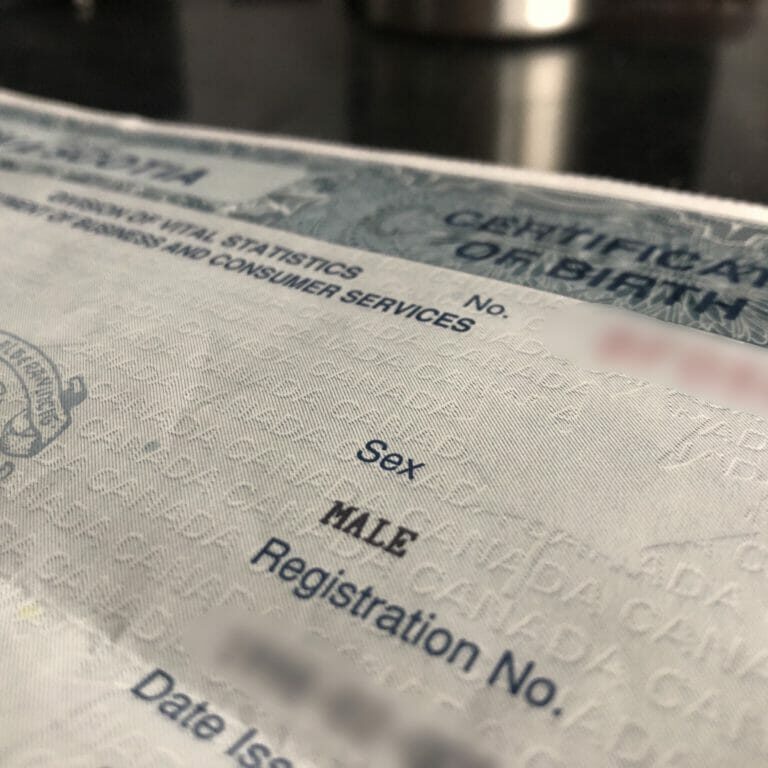
Nova Scotia’s new gender option for birth certificates
Is X the answer?
Nova Scotians now have a new gender marker option for birth certificates.
As part of changes to the Vital Statistics Act, the provincial government is introducing the letter “X” as a gender option for all birth certificates in Nova Scotia. This change is in addition to the previous choice of “F” or “M.”
On top of this, the fee that was previously required to change the sex indicator will be waived at the time of gender changes. However, children’s genders will still be recorded as “M” or “F” at birth.
Although views surrounding these changes have been generally positive, some have voiced concerns surrounding the general safety and purpose of the update.
“If we talk about the broad scale of what the addition means, I think it’s a really great addition in validating non-binary identities through legislation,” said Frank Heimpel, a non-binary Haligonian. “However, while this is a really good first step, we need to be moving towards not unnecessarily gendering things. For example, questioning why do we have these things? Why do we have gender markers on our birth certificates or our passports or licenses? And is it necessary? And if so, why is it necessary?”
Heimpel continued, bringing up their fears concerning safety and discrimination once the changes have been made.
“As a non-binary person, I could put an ‘X’ on my birth certificate and feel more validated but then I could also feel like it opens up this opportunity for people who are looking at your documents to be like, ‘Oh, a reason to discriminate against this person even more than usual.’”
Although these changes were introduced to provide an option for non-binary and transgender people who would rather not identify themselves as one of two options, the “X” may be used by any person.
The “X” is an opportunity for any Nova Scotians who would rather opt out of including their gender on their birth certificate.
In fact, in Ontario and Saskatchewan, there is an option to completely remove gender markers from certificates at the moment of birth. Newfoundland and Labrador, Alberta, Yukon and the Northwest Territories also offer the use of “X” on birth certificates while the federal government includes the choice to use an “X” on all passports.
“The proposed changes take many important steps toward meeting the needs of Nova Scotians who do not wish to be identified by sex,” Shae Morse, a non-binary teacher and community advocate, said in a government news release. “Providing Nova Scotians with additional options to identify themselves or their children removes a significant barrier facing the LGBTQ community. While there is work left to do to remove barriers for our community, the passage of this legislation will truly be worth celebrating.”
Change of Name Act
Amendments to the Change of Name Act have also been made. These changes would aim to shorten the amount of time a person born outside of Nova Scotia would have to live in the province before legally changing their name, from three months from one year. Altogether, these changes set a strong tone as the province heads into 2019.
“Introducing these changes to the birth certificate is another example of how Nova Scotia is recognizing and supporting all persons in their right to have their gender and identity recognized and respected,” said Service Nova Scotia Minister Geoff MacLellan in the press release. “Adding ‘X’ to the birth certificate will allow people who don’t identify exclusively as male or female to more accurately reflect their gender identity.”
Even though they are one of the people who are skeptical about changes, Heimpel is hopeful for the future of relations between the Nova Scotian Government and non-binary citizens like them. “I think Nova Scotia can be a little slow to catch up. We’re living like five to 10 years behind everyone else, but I think I think it is a good step in the right direction,” said Heimpel
“Non-binary people will have different reactions. Some might think ‘wow, this feels so good and will finally validate who I am. This is all I’ve been waiting for my entire life, it’s not just an ‘X’ on my birth certificate.’ However, there will be other people who are like, ‘I don’t want that. I wouldn’t change it, even though I strongly and ultimately identify as non-binary because of safety and because I have already been forced to fight for this before.’”






